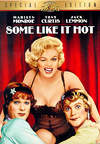Some Like It Hot
MGM Home Entertainment
Cast: Marilyn Monroe, Tony Curtis, Jack Lemmon
Extras: ‘A Look Back’ with Leonard Maltin and Tony Curtis, ‘The Sweet Sues’ Featurette, Hall of Memories Featurette, Trailer
Rating:
Tony Curtis and Jack Lemmon star as Joe and Jerry, two musicians making the circuit of illicit gin joints in Prohibition-era Chicago. Times are tough. Seemingly the only gig available is for a women-only band playing in Florida. Bad timing lands them as witnesses to a St. Valentine’s Day massacre and the target of mobster "Spats" Colombo (George Raft). Looking to escape Chicago and a one-way ticket to eternity, Joe and Jerry do the unthinkable: swallow their pride (and their Adam’s apples if they could) and pose as women musicians for Sweet Sue and Her Society Syncopators.
Now clad in flapper dresses and stockings, "Josephine" (Tony Curtis) and "Daphne" (Jack Lemmon) must keep up appearances to escape detection. Not an easy feat when both become enamored of the band’s lead singer, Sugar Kane (Marilyn Monroe). In Florida, Joe finds himself falling in love with Sugar while Daphne is caught in the predatory cross hairs of bored millionaire Osgood Fielding III (Joe E. Brown). As with all good farces, passions momentarily erupt and unmaskings almost occur as the characters merge into a crowded arena for one final roundelay.
The transfer is <$PS,letterboxed> with a mild 1.66 aspect ratio, but is not <$16x9,anamorphic>ally enhanced. Despite a few blemishes and nicks, the source elements look practically new. Solid black levels and excellent gray scale contribute to a sharp and crystal clear picture. Offering superb detail delineation, the transfer captures the sheen off the nighttime Chicago streets or the bright sunlight beach shores without breaking a digital sweat. Shadow definition is no less amazing; check out Chapter 15 and the cake scene at the Italian Opera Lovers banquet. With the lights out and a hot back-lit source, details like the tableware and facial features can be still read. Edge enhancement is apparent in some scenes, a few times to distraction. No other digital or compression artifacts cropped up.
The supplemental materials start with a new interview with star Tony Curtis. Running thirty minutes, the shot-on-video interview is moderated by entertainment historian and fellow DVD fan Leonard Maltin at the historic Formosa Café, across the street from the former Samuel Goldwyn Studios where the interiors were filmed. (Fans might remember the Formosa Café’s appearance in "L.A. Confidential.") They have a good rapport, with Leonard eliciting quite a few memories from Tony. Apparently, Tony was part of the original casting while Wilder sought Frank Sinatra for the Lemmon role and Mitzi Gaynor for Marilyn’s part. Tony’s remembrances swing from Wilder’s method of directing Marilyn (always ready to "print" a shot with her scenes) to aping Cary Grant’s accent to the vicissitudes of bathroom trips while in costume. He even takes the opportunity to categorically deny an infamous quote attributed to him about Marilyn and kissing Hitler (no fooling).
The "Memories from the Sweet Sues" featurette reunites four actresses who helped comprise Sweet Sue’s Society Syncopators. Marian Collier ("Olga"), Laurie Mitchell ("Mary Lou"), Sandra Warner ("Emily") and Joan Nicholas ("Betty") begin their journey by pouring over a photo album, giggling and cooing about working on the set and with Tony, Jack and Marilyn. After that, each contributes various anecdotes in a free-form format. In addition to heaping praise on their co-stars and the director, they honor the wonderful character actress Joan Shawlee who played Sweet Sue. One interesting revelation comes from Sandra about her connection to the advertising. (I won’t spoil it, but you won’t look at the ad artwork the same way again.) The segment runs eleven minutes.
The original press book gallery gives a page-by page excursion of the advertisements and articles created by the studio to help market and position the film. On each page, red dots mark where enlargement is available, making it much easier on the eyes to read and examine.
The original theatrical trailer gets its own spot on the disc, while the "Billy Wilder Film Trailers" cram five titles into another section with menu access. The other Wilder films represented are "Avanti," "The Private Life of Sherlock Holmes," "The Fortune Cookie," "Kiss Me Stupid" and "The Apartment." Varying in aspect ratio, the trailers are presented <$PS,widescreen> with scratchy mono sound and varying image quality. If anything, the snippets of such films as "Kiss Me Stupid" (Wilder at his most sexist) and "Sherlock Holmes" (Wilder in an inventive and playful mood) underscore how the format has a long way to go in broadly representing one of America’s genius filmmakers.
On the surface, in our current "anything goes" environment, the shock value of "Some Like It Hot" now seems antiquated. In 2058, when the "Some Like It Hot" Centennial Special Edition comes out on SDFC or Super Digital Floppy Chips, I imagine viewers will remark how the film seems remarkably prescient of their sexual politics. Shakespeare knew sex sells, so did Wilder. Only the dresses change.







